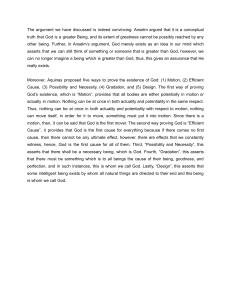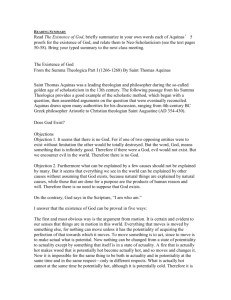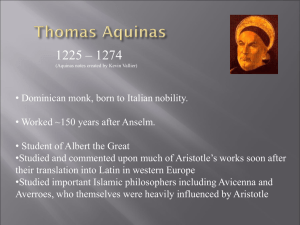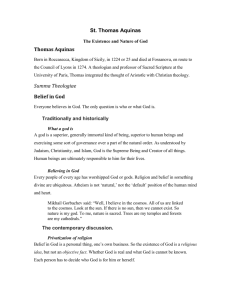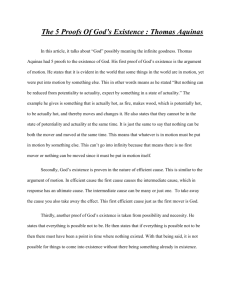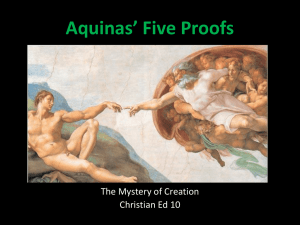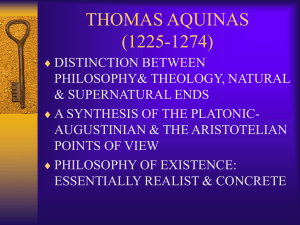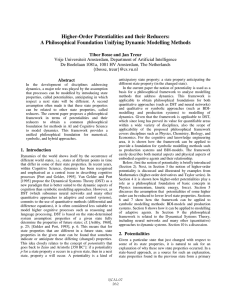Aquinas Quiz
advertisement
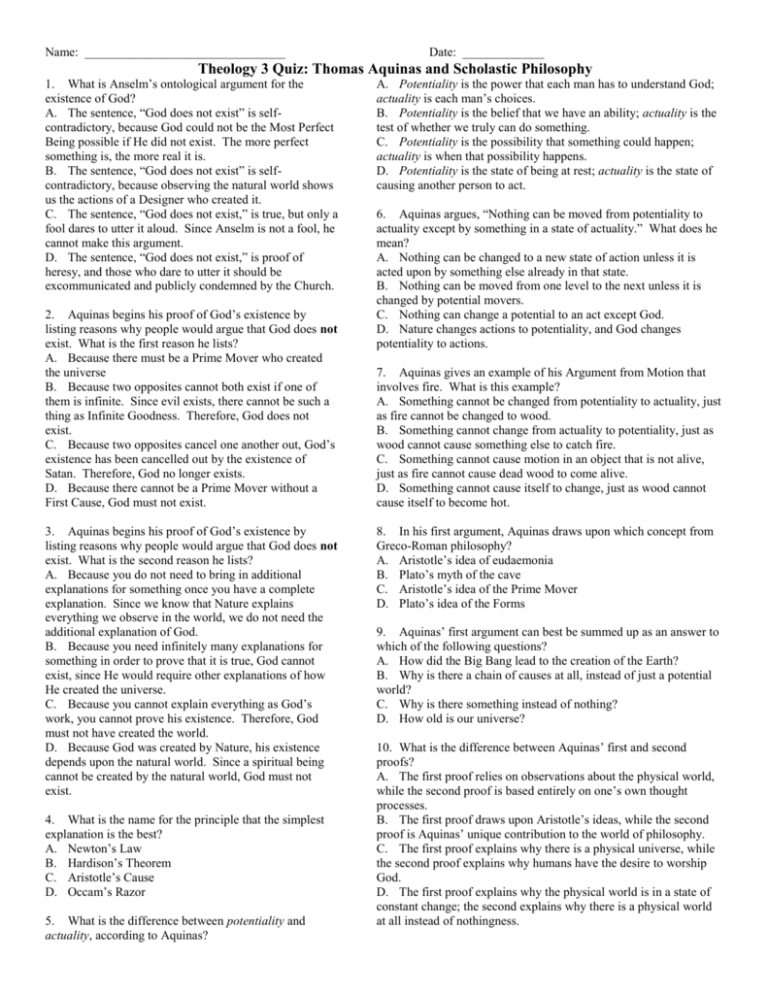
Name: ________________________________ Date: _____________ Theology 3 Quiz: Thomas Aquinas and Scholastic Philosophy 1. What is Anselm’s ontological argument for the existence of God? A. The sentence, “God does not exist” is selfcontradictory, because God could not be the Most Perfect Being possible if He did not exist. The more perfect something is, the more real it is. B. The sentence, “God does not exist” is selfcontradictory, because observing the natural world shows us the actions of a Designer who created it. C. The sentence, “God does not exist,” is true, but only a fool dares to utter it aloud. Since Anselm is not a fool, he cannot make this argument. D. The sentence, “God does not exist,” is proof of heresy, and those who dare to utter it should be excommunicated and publicly condemned by the Church. 2. Aquinas begins his proof of God’s existence by listing reasons why people would argue that God does not exist. What is the first reason he lists? A. Because there must be a Prime Mover who created the universe B. Because two opposites cannot both exist if one of them is infinite. Since evil exists, there cannot be such a thing as Infinite Goodness. Therefore, God does not exist. C. Because two opposites cancel one another out, God’s existence has been cancelled out by the existence of Satan. Therefore, God no longer exists. D. Because there cannot be a Prime Mover without a First Cause, God must not exist. 3. Aquinas begins his proof of God’s existence by listing reasons why people would argue that God does not exist. What is the second reason he lists? A. Because you do not need to bring in additional explanations for something once you have a complete explanation. Since we know that Nature explains everything we observe in the world, we do not need the additional explanation of God. B. Because you need infinitely many explanations for something in order to prove that it is true, God cannot exist, since He would require other explanations of how He created the universe. C. Because you cannot explain everything as God’s work, you cannot prove his existence. Therefore, God must not have created the world. D. Because God was created by Nature, his existence depends upon the natural world. Since a spiritual being cannot be created by the natural world, God must not exist. 4. What is the name for the principle that the simplest explanation is the best? A. Newton’s Law B. Hardison’s Theorem C. Aristotle’s Cause D. Occam’s Razor 5. What is the difference between potentiality and actuality, according to Aquinas? A. Potentiality is the power that each man has to understand God; actuality is each man’s choices. B. Potentiality is the belief that we have an ability; actuality is the test of whether we truly can do something. C. Potentiality is the possibility that something could happen; actuality is when that possibility happens. D. Potentiality is the state of being at rest; actuality is the state of causing another person to act. 6. Aquinas argues, “Nothing can be moved from potentiality to actuality except by something in a state of actuality.” What does he mean? A. Nothing can be changed to a new state of action unless it is acted upon by something else already in that state. B. Nothing can be moved from one level to the next unless it is changed by potential movers. C. Nothing can change a potential to an act except God. D. Nature changes actions to potentiality, and God changes potentiality to actions. 7. Aquinas gives an example of his Argument from Motion that involves fire. What is this example? A. Something cannot be changed from potentiality to actuality, just as fire cannot be changed to wood. B. Something cannot change from actuality to potentiality, just as wood cannot cause something else to catch fire. C. Something cannot cause motion in an object that is not alive, just as fire cannot cause dead wood to come alive. D. Something cannot cause itself to change, just as wood cannot cause itself to become hot. 8. In his first argument, Aquinas draws upon which concept from Greco-Roman philosophy? A. Aristotle’s idea of eudaemonia B. Plato’s myth of the cave C. Aristotle’s idea of the Prime Mover D. Plato’s idea of the Forms 9. Aquinas’ first argument can best be summed up as an answer to which of the following questions? A. How did the Big Bang lead to the creation of the Earth? B. Why is there a chain of causes at all, instead of just a potential world? C. Why is there something instead of nothing? D. How old is our universe? 10. What is the difference between Aquinas’ first and second proofs? A. The first proof relies on observations about the physical world, while the second proof is based entirely on one’s own thought processes. B. The first proof draws upon Aristotle’s ideas, while the second proof is Aquinas’ unique contribution to the world of philosophy. C. The first proof explains why there is a physical universe, while the second proof explains why humans have the desire to worship God. D. The first proof explains why the physical world is in a state of constant change; the second explains why there is a physical world at all instead of nothingness.
